|
|
|
Sort Order |
|
|
|
Items / Page
|
|
|
|
|
|
|
| Srl | Item |
| 1 |
ID:
133202
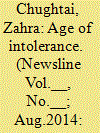

|
|
|
|
|
| Publication |
2014.
|
| Summary/Abstract |
To ensure our success as nation, we need to turn our attention to the country soul since the vast subcontinent was divided, and than some 20 odd years later sub-divided once again, Pakistanis have plenty to ponder.
|
|
|
|
|
|
|
|
|
|
|
|
|
|
|
|
| 2 |
ID:
133405
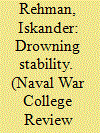

|
|
|
|
|
| Publication |
2012.
|
| Summary/Abstract |
In May 1998, the sun-scorched deserts of the Indian state of Rajasthan shook with a succession of nuclear explosions. Barely two weeks later, in a seemingly tit-for-tat response, Pakistan conducted its own series of detonations, in the remote western hills of Baluchistan. Both nations' previously concealed nuclear capabilities had suddenly burst out into the open, giving a new and terrifying form to the enduring rivalry that had convulsed the subcontinent for decades. Caught off guard, the international community reacted with indignation and dismay. Concerns over nuclear escalation in the event of another Indo-Pakistani conflict refocused Washington's attention on South Asia and triggered the longest sustained level of bilateral Indo-American engagement in history. This had the unexpected benefit of enabling both democracies finally to find common ground, after many years of acrimony, chronic mistrust, and squandered opportunities. Fears of mass terrorism in the wake of 9/11 and subsequent revelations of extensive proliferation emanating from Pakistan added urgency to Western desires to preserve a modicum of crisis stability in South Asia, as well as to prevent any form of escalatory behavior that could spiral into nuclear conflict or further the spread of radioactive material.
|
|
|
|
|
|
|
|
|
|
|
|
|
|
|
|
| 3 |
ID:
193236
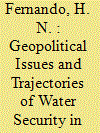

|
|
|
|
|
| Summary/Abstract |
In the current academic debate on non-traditional security, the issue of water security has come to the forefront of discussions. This is primarily due to the developing discourse on climate change as a threat multiplier linked with conflicts surrounding access, use, and the management of shared water resources. The Indian subcontinent is therefore an interesting case study where water security and inter-connected security issues have converged as both internal and external security threats. Using the case study of the Indian Subcontinent, this essay serves to enrich the debate on geopolitical challenges and the paths toward achieving water security. The essay provides a general review of the security environment, including the risks and vulnerabilities facing the Indian subcontinent and challenges to water governance arising from both internal and external security concerns, through examples of geopolitical tensions in the region. This includes India, Pakistan, Bangladesh, Afghanistan, Nepal, China, and Tibet (the latter which forms the Hindu Kush Himalaya region). The research leads to the conclusion that institutional structures may be able to reduce regional tensions.
|
|
|
|
|
|
|
|
|
|
|
|
|
|
|
|
| 4 |
ID:
075883
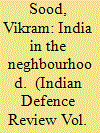

|
|
|
| 5 |
ID:
158888
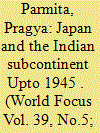

|
|
|
|
|
| Summary/Abstract |
Japan’s politico-strategic involvement in Indian subcontinent in the pre-1945 period was peripherally linked to Japan’s larger goal of establishing its pan-Asiatic empire under the official policy of establishing an Asian empire under the grand title of “Greater East Asia Co-prosperity Sphere” under the overarching leadership of Japan, when Japan, during its military campaigns against the British in South East Asian countries, realized the importance of a large Indian diaspora in South East Asia, seething with revolutionary zeal against the British rule in India and decided to utilize them for an anti-British propaganda offensive as well as for gathering precious intelligence information through their India networks.
|
|
|
|
|
|
|
|
|
|
|
|
|
|
|
|
| 6 |
ID:
184440
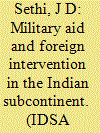

|
|
|
| 7 |
ID:
143056
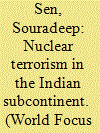

|
|
|
|
|
| Summary/Abstract |
Terrorism is a term with no agreed definition among governments or academicians, but is almost used exclusively in a pejorative sense, to describe life-threatening actions perpetrated by politically motivated self-appointed sub-state groups. A more accurate definition has been proffered by the International Institute for Strategic Studies, London: terrorism is the use of violence, often against people not directly involved in a conflict, by groups operating clandestinely, which generally claim to have high political or religious purposes, and believe that creating a climate of terror will assist attainment of their objectives.
|
|
|
|
|
|
|
|
|
|
|
|
|
|
|
|
| 8 |
ID:
130010
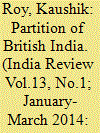

|
|
|
|
|
| Publication |
2014.
|
| Summary/Abstract |
The Partition of the British Indian Empire in the summer of 1947 was a watershed in British-Imperial as well as South Asian history. From the imperial perspective, the British Empire lost much of its luster after the loss of its jewel in the crown. From the perspectives of the inhabitants of the Indian subcontinent, several millions died in the ensuing Partition riots and the mass migrations following the division of British India into two new sovereign countries: India and Pakistan. Today American, British, Indian, Pakistani, and to a lesser extent Bangladeshi scholars continue to debate various aspects of the Partition of India.
|
|
|
|
|
|
|
|
|
|
|
|
|
|
|
|
| 9 |
ID:
076065


|
|
|
|
|
| Publication |
2006.
|
| Summary/Abstract |
Class explains much in the differentiation of life chances and political dynamics in South Asia. Yet in the subcontinent class has lost its centrality as a way of understanding the world and how it changes. Indian intellectuals have been a major force in the eclipsing of class through discursive strategies of constructivist idealism. Formalism in social sciences finds class relations elusive and difficult to measure. Market triumphalism eclipsed concern with rehabilitation of "weaker sectors" and redressing of exploitation as measures of national success. Class analytics, however, continues to serve two critical functions: disaggregating development and explaining challenges to rules of the game. Restoring agency to class requires attention first to relations that structure choice in restricted or expansive ways. Global forces have altered people's relations to production and to one another, as have changes in the political opportunity structure, with significant effects on tactics and outcomes. Knowing how to aggregate or disaggregate classes is more complicated than ever. Nevertheless, alternative understandings of class structure are more than academic: they reflect the strategies of political actors. The difficulty for class analysis is to illuminate the conditions under which interests of those disabled by particular class systems may be inter-subjectively recognized and acted upon politically at the local and/or international levels. Appropriate and robust sociopolitical theory for this purpose is illusive, but no more so for class than for other bases of difference - caste, community, identity, gender-that likewise seek to explain transformation of locations in social structures to effective collective agency
|
|
|
|
|
|
|
|
|
|
|
|
|
|
|
|
| 10 |
ID:
178413
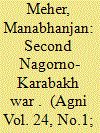

|
|
|
| 11 |
ID:
124291
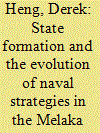

|
|
|
|
|
| Publication |
2013.
|
| Summary/Abstract |
The Strait of Melaka and connected waterways have been critical to, and directly affected, the formation of littoral states, societies and economies in eastern Sumatra, the Riau Islands, the Malay Peninsula, and Singapore. The history and nature of statehood in the region is interrelated to the way in which naval capabilities evolved, but, as argued in this article, perhaps not in the straightforward fashion often assumed. Naval capabilities and strategies evolved in tandem with state policy to adapt to changes in the wider Asian maritime political economy which was dominated at various times by China and India. This article examines the factors that affected maritime policy in the Melaka Straits c. 500 to 1500 CE, and the extent to which these furthered the viability of the mainly Malay port-polities, and in particular the regional hegemonic state of Srivijaya in eastern Sumatra. The study utilises textual records, epigraphic materials, and literature to reconstruct a more nuanced picture of maritime states and naval power in premodern Southeast Asia.
|
|
|
|
|
|
|
|
|
|
|
|
|
|
|
|
| 12 |
ID:
133097
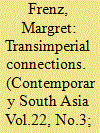

|
|
|
|
|
| Publication |
2014.
|
| Summary/Abstract |
Throughout 2011, events celebrating, debating and criticizing the 50 years of Goa's existence within the Indian Union took place across Goa. These debates oscillated between the poles of perceiving what happened on the 19 December 1961 as either 'liberation' or 'occupation', reflecting the broad spectrum of perspectives at the time. Missing from these discussions were the views of Goans beyond Goa, across the Indian Ocean in East Africa and further afield. Even when divided by the Indian Ocean from life in Goa, they retained an interest in their country of origin. This paper uses archival and oral history sources to contextualize and understand East African Goans' responses, to address this gap in the literature, to problematize some existing accounts of the events and to draw attention to the significance of transimperial connections across the Indian Ocean. I argue that the lack of active involvement in political developments by the majority of Goans - whether they were in Goa or in East Africa - was intimately linked to the anxiety many of them felt about what the creation of nation-states in both the Indian subcontinent and East Africa would mean in practical terms for individuals' lives 'on the ground'
|
|
|
|
|
|
|
|
|
|
|
|
|
|
|
|
|
|
|
|
|